Abstract:
The purpose of the study is to explore the negative role of social media on university students’ mental health amidst digitalized COVID-19 setting that throbs excruciating pain, fear, anxiety, stress and depression. The quantitative and qualitative data were collected from the Department of English students of a public university in Punjab, Pakistan. The findings reveal that students are engaged daily for 4 hours on social media forums for online chats, information and amusement. The social media platforms strategically create situations to express unrestrained sentiments. The use of cartoons and images reflect students’ potential for creativity, criticality and social innovation
Key Words
Social Media, Negative Role, Emotions, Creativity, COVID-19
Introduction
The global pandemic has resulted in massive and unprecedented fear; fear of contagion, fear of each other-a, a fear that can’t be simply mitigated with online chats, webinars or learning platforms. Amidst the COVID-19 setting of social distancing and isolation, social media can be an invaluable tool for keeping us connected with friends and the wider world. However, it is observed that social media has exacerbated our stress, anxiety, distress and uncertainty (Appel et al., 2016; Banjanin et al., 2015; Ellison, 2013). Using social media more often increases fear of missing out (FOMO) and feelings of inadequacy, frustration and isolation. In turn, these feelings negatively affect people’s moods and intensify their depression (Vernon et al., 2017; Wang et al., 2018; Wang, 2006; Yan et al., 2017; Yu & Tse, 2012). The rationale of the study is to discuss the impact of social media on the mental well being of university students. The students behave anxiously and preposterously on social media amidst COVID-19. The research question is:
RQ: What is the role of social media in the creation of negative sentiments among university students amidst COVID-19?
Literature Review
It is noted that virtual interaction on social media does not have the same psychological benefits as face-to-face contact, but there are several positive ways that support our mental health. Social media helps us to stay in regular touch with family and friends across the world (Asare, 2015; Baker & Algorta, 2016; Frison, 2016; Steger, 2009). It is a useful platform to make new friends and develop networks with people having similar ambitions and interests. We can find outlets for our creative and artistic expressions. It is a productive learning forum as we can attend webinars, workshops and conferences (Jin, 2013; Manago et al., 2012; Marino et al., 2018; Nabi, 2013).
However, multiple research studies have explored that excessive dependence on social media creates increased risk for anxiety, depression, loneliness, suicidal thoughts and self-harm. Social media amidst COVID-19 has promoted negative sentiments such as shortcomings of life or appearance, fear of missing out (FOMO), low self-esteem, frustration, inner void, delusion, dissatisfaction, isolation, distress, cyberbullying and unhealthy self-centeredness (Fernandez et al., 2012; Green et al., 2016). The children and adults are distracted from work and study. People suffer from serious sleep problems. There is little time for self-reflection and critical thinking (Hong et al., 2014; Koc &
Gulyagci, 2012; Kross et al., 2013).
Walton (2018) thoughtfully writes that mindlessly scrolling through social media is not a healthy habit regarding our collective psychology. The American Academy of Pediatrics has researched the negative effects of social media in young kids and teens, including cyber-bullying and "Facebook Depression." The same risks are applicable to adults across generations. Social media, for instance, Facebook causes “Facebook Addiction Disorder’ as it results in neglect of personal life, mental preoccupation, escapism, mood modifying experiences etc. People who are over-dependent on digital devices report feelings of anxiety. Social media use such as Facebook, Twitter, Google+, YouTube, LinkedIn, Instagram, Pinterest, Tumblr, Vine, Snapchat and Reddit are linked to greater feelings of social isolation as compared to other solitary activities such as reading books, watching movies etc. (Labrague, 2014; Lee et al., 2015).
It is revealed that the more time people spend on these sites, the more mental and physical social isolation is perceived. This social isolation has depressive symptoms. Studies have certainly shown that social media use triggers invidious feelings such as jealousy that is connected with depression (Walton, 2018; Wilson, 2012). People are deluded into thinking that it will help, though they do not feel comfortable (Yan et al., 2017; Yu & Tse, 2012). More importantly, more friends on social media don’t mean that you have more friends and social networking. Rather loneliness is an outcome that is naturally linked to myriad health and mental health problems, including early death. Time spending with virtual friends does not have the therapeutic effect as time with real friends (Vernon et al., 2017; Wang et al., 2018; Wang, 2006).
Research Methodology
The researcher collected the data from a large scale public sector university with several campuses across the province of Punjab, Pakistan. The mixed-method approach was used for carrying out the investigation about the impact of social media on university students’ mental health amidst COVID-19. The quantitative instrument is the Google Survey Form. The link of the form was shared with the students of BS English, MA English and MPhil English Linguistics students in their Google Classrooms and Whatsapp groups. 135 students filled in an online Google Survey Form. The questions were:
1. How much time is spent on social media?
2. Do you visit social media frequently?
3. Are social media tools persuasive for students?
4. Do social media apps create negative feelings among students?
5. Do social media apps positively motivate students?
6. Do social media apps affect students’ psychology?
7. Do social media apps have productive uses?
8. Have social media apps enhanced anxiety among students amidst COVID-19?
The qualitative tools were university students’ comments and posts (cartoons) on facebook. The student community pages were explored to collect evidence about the negative uses of social media. Besides comments, Tom and Jerry cartoon images were collected to discuss students’ anxiety amidst COVID-19. The author worked on 20 students’ comments and 5 images of the Tom and Jerry cartoon.
Findings and Discussion
This section presents both quantitative and qualitative evidence. The researcher has collected data in 3 phases. In the 1st phase, quantitative data (Part A) was collected and analyzed. The qualitative data in the 2nd and 3rd phases (Parts B & C) was collected and analyzed. The purpose of qualitative findings is to reinforce the quantitative outcomes.
Data from the Google Survey Form
The data from Google Survey Form is presented as follows:
Time Spent on Social Media
Interestingly, Figure 1 shows that 34.8% of university students spend 4 hours on social media, 20% are in the habit of spending 3 hours on social media, 18.5% have 2 hours on social apps, and 16.3% use social media for an hour. It is noted that 10.4% of students do not like social media
Productive Uses of Social Media
Figure 2 depicts that 83.7% of students report that they are able to engage in productive activities on social media.
Figure 3
The Persuasiveness of Social Media Tools
Figure 3 evidently shows that 84.4% of students are easily swayed away by social media posts and advertisements.
Social Media Positively Influences Students
Figure 4 reports that 80.7% of students believe that social media positively influences their minds with beneficial information and creative activities. They find social media apps entertaining and productive.
Social Media Positively Influences Students
78.5% of students believe that social media influences their mental well-being. It has psychological implications for them.
Social media Enhances Anxiety among Students
More importantly, Figure 6 explicitly indicates university students’ anxiety at the hands of social media. The use of social media has escalated their fear amidst COVID-19. It has a stressful and depressing impact on their minds
Figure7
Social media creates negative feelings
It is found out that 74.8% of university students report that social media uses evoke negative sentiments and emotions that naturally release depression, stress and anxiety.
Participants’ Views Gathered from Social Media
Part B discusses participants’ perceptions collected from students’ Facebook groups. Their views reflect their negative feelings for university management. They oppose university management’s decision about online physical examination at university campuses vehemently. Their perceptions are:
“Management, your decision won't work, won't work (S1). “This is a one-sided, biased decision. Where is the struggle of those who are protesting for 3 days? Where are the efforts of those who were beaten by police? Where are the efforts of those who were threatened by the management of the university?”(S2). “University thinks the students as a flock. They think we will give the command and the flock will follow” (S3). “Truth is that university has no concerns for students” (S4). “Look who's talking. Our future is in their hands. They need clapping (S5). “We will assert our rights now” (S6). “How do you feel about university’s mockery? We reject it” (S7). “Allah is a witness that these professors have not taken more than 4 lectures” (S8). “We will take the online examination on campus using our own package. This is ridiculous” (S9). “I can’t understand what’s wrong with you people; you are creating unrest in students” (S10). “The university is abusing us” (S11). “University should give us back our fee” (S12). “The drama with students is rejected. We boycott examination” (S13). “We want online examination from homes” (S14). “The students should join hands to quit examinations” (S15). “I protest against this policy” (S16). “This is a very critical issue regarding mode of examination” (S17). “We are extremely disappointed” (S18). “Our movement failed because we lacked unity, political power, valid and authentic reasons and leadership” (S19). “We can’t convince management because of hypocritical students amongst us” (S20).
It is perceived from students’ comments on Facebook pages that they are grabbed by anxiety and stress. Using social media forums, they resist physical online assessment amidst the COVID-19 scenario. It is interpreted that university management decision is considered biased and incongruous. They are not allowed to approach university management; therefore, they raise their voices using social media forums. They release their frustration, fury and disappointment through impolite commentary that evidently depicts that they are under the negative influence of social media apps. They report that university management is least concerned about students’ futures and has deliberately created unrest in them. Their inconsiderate perceptions expose their disrespectful attitudes towards faculty and administration. They endeavoured to motivate and persuade their friends to join this protest and physical online examination boycott movement, but their efforts went in vain. Afterwards, students rationalize the reasons for their ineffective and fruitless implementation of the plan to convince authorities about their biased decision of conducting online assessment in physical mode.
Research Participants Demonstrate their Negative Feelings through Tom and Jerry Cartoon
This part demonstrates students’ potential for
creativity and criticality. They have posted the images from Tom and Jerry cartoon on Facebook pages to express their anger, anxiety, fear and stress about online assessment in the physical setting
Picture 1 articulates the university’s unjustified wrath against students. Picture 2 symbolizes students’ fear for their bleak future as an outcome of results that will be achieved from an online assessment conducted physically. Picture 3 stands for faculty’s inflexible and unsupportive behavior. Picture 4 makes an appeal for mercy and shows the power struggle between weak and strong people. Lastly, Picture 5 demonstrates the university management’s victory and suppression of students’ demands.
Conclusion and Recommendations
It is concluded that most university students spend at least 4 hours on social media to acquire learning, information and amusement. The data evidently reveals students’ unrest, anxiety, depression and stress for being excessively engaged in social media activities. Most probably, they spend little time on problem-solving tasks or scholarly activities related to self-reflection and self-awareness. They are also using social media forums to raise their voices against unjust decisions. They use threatening and outrageous language for faculty and administration of the university to change the direction of the situation to their own best interests. However, the uses of cartoons express their tendency for creativity, social innovation and humor. It is important for university students to reduce their time on social media through the removal of social media notifications and apps from their phones. They should keep their focus their attention on their academic work and problem-solving tasks. They should use social media with ethics, mindfulness, self-reflection, innovation, criticality and artistic skills. They may unfollow any social media group or page that intentionally stirs up their emotions to create anxiety in them.
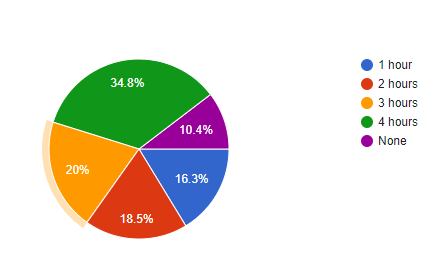
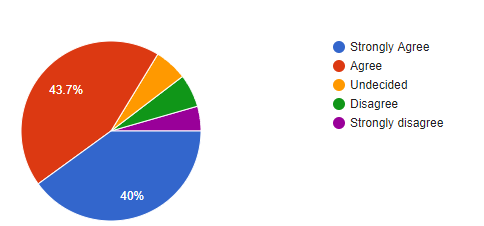
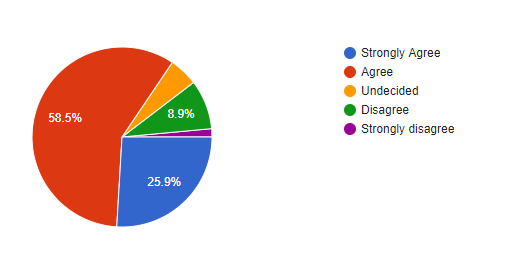



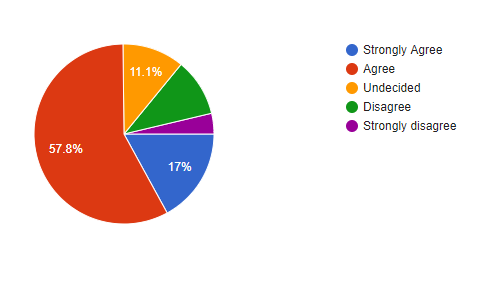
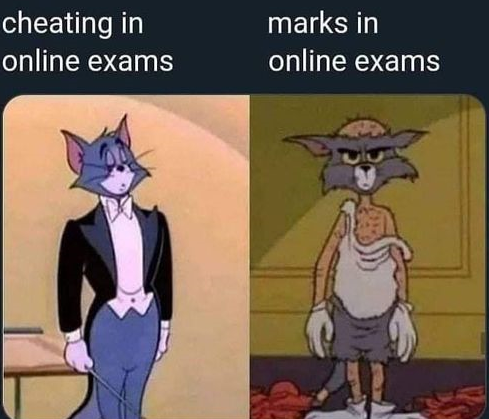




References
- Appel, H., Gerlach, A. L., & Crusius, J. (2016). The interplay between Facebook use, social comparison, envy, and depression. Current Opinion in Psychology, 9, 44-49.
- Asare, M. (2015). Sedentary behaviour and mental health in children and adolescents: A meta-analysis. Journal of Child and Adolescent Behavior, 3, 259.
- Baker, D. A., & Algorta, G. P. (2016). The relationship between online social networking and depression: A systematic review of quantitative studies. Cyberpsychology, Behavior, and Social Networking, 19(11), 638-648.
- Banjanin, N. Banjanin, N. Dimitrijevic, I. & Pantic, I. (2015). Relationship between internet use and depression: Focus on physiological mood oscillations, social networking and online addictive behavior. Computers in Human Behavior, 43, 308-312.
- Ellison, N. B., Boyd, D. M. (2013). Sociality through social network sites. In: Dutton WH, editor. The Oxford Handbook of Internet Studies. Oxford: Oxford University Press, pp. 151-172.
- Fernandez, K. C., Levinson, C. A., Rodebaugh, T. L. (2012). Profiling: predicting social anxiety from Facebook profiles. Soc Psychological Pers Sci. 19;3(6):706-713. doi: 10.1177/1948550611 434967.
- Frison, E., & Eggermont, S. (2016). Exploring the relationships between different types of facebook use, perceived online social support, and adolescents' depressed mood. Social Science Computer Review, 34(2), 153-171.
- Green, T. Wilhelmsen, T. Wilmots, E. Dodd, B. Quinn, S. (2016). Social anxiety, attributes of online communication and self-disclosure across private and public Facebook communication. Comput Human Behav. 58:206-213. doi: 10.1016/j.chb.2015.12.066.
- Hong, F. Huang, D. Lin, H. Chiu, S. (2014). Analysis of the psychological traits, Facebook usage, and Facebook addiction model of Taiwanese university students. Telemat Inform. 2014 Nov; 31 (4):597-606. doi: 10.1016/j.
- Jin, B. (2013). How lonely people use and perceive Facebook. Comput Human Behav. 2013 Nov; 29 (6):2463-2470. doi: 10.1016/j.chb.
- Koc, M. Gulyagci, S. (2012). Facebook addiction among Turkish college students: the role of psychological health, demographic, and usage characteristics. Cyberpsychol Behav Soc Netw. 2013 Apr;16(4):279-84. doi: 10.1089/cyber.
- Kross, E. Verduyn, P. Demiralp, E. Park, J. Lee, D. S., Lin, N. Shablack, H. Jonides, J. Ybarra, O. (2013). Facebook use predicts declines in subjective well-being in young adults. PLoS One. 8(8):e69841. doi: 10.1371/journal.pone.0069841. http://dx. plos.org/10.1371/ journal.pone.0069841.
- Kross, E. Verduyn, P. Demiralp, E. Park, J. Lee, D. S., Lin, N. Shablack, H. Jonides, J. Ybarra, O. (2013). Facebook use predicts declines in subjective well-being in young adults. PLoS One. 8(8):e69841. doi: 10.1371/journal.pone.0069841. http://dx. plos.org/10.1371/ journal.pone.0069841.
- Labrague, L. J. (2014). Facebook use and adolescents' emotional state of depression, anxiety, and stress. Health Sci J. 8(1):80-89. doi: 10.1145/1316624.1316682.
- Lee-Won RJ, Herzog, L. Park, S. G. (2015). Hooked on Facebook: the role of social anxiety and need for social assurance in problematic use of Facebook. Cyberpsychol Behav Soc Netw. 18(10):567-74. doi: 10.1089/cyber.2015.0002.
- Manago, A. M., Taylor, T, Greenfield, P. M. (2012). Me and my 400 friends: the anatomy of college students' Facebook networks, their communication patterns, and well-being. Dev Psychol. 48(2):369- 80. doi: 10.1037/a0026338.
- Marino, C., Gini, G., Vieno, A., & Spada, M. M. (2018). The associations between problematic Facebook use, psychological distress and well-being among adolescents and young adults: A systematic review and meta- analysis. Journal of Affective Disorders, 226, 274-281. Elsevier BV
- Nabi, R. L., Prestin, A. So, J. (2013) Facebook friends with (health) benefits? Exploring social network site use and perceptions of social support, stress, and well- being. Cyberpsychol Behav Soc Netw. 16(10):721-7. doi: 10.1089/cyber.2012.0521.
- Steger. M. F. Kashdan, T. B. (2009). Depression and everyday social activity, belonging, and well-being. J Couns Psychol. 56(2):289-300. doi: 10.1037/a0015416. http://europepmc.org/ abstract/MED/20428460.
- Steger. M. F. Kashdan, T. B. (2009). Depression and everyday social activity, belonging, and well-being. J Couns Psychol. 56(2):289-300. doi: 10.1037/a0015416. http://europepmc.org/ abstract/MED/20428460.
- Vernon, L. Modecki, K. L., & Barber, B. L. (2017). Tracking effects of problematic social networking on adolescent psychopathology: The mediating role of sleep disruptions. Journal of Clinical Child and Adolescent Psychology, 46(2), 269-283.
- Walton, A. (2018). 6 Ways Social Media Affects Our Mental Health. Retrieved from http://www.forbes.com.
- Walton, A. (2018). 6 Ways Social Media Affects Our Mental Health. Retrieved from http://www.forbes.com.
- Wang, P. Wang, X. Wu, Y. Xie, X. Wang, X. Zhao, F. ... Lei, L. (2018). Social networking sites addiction and adolescent depression: A moderated mediation model of rumination and self- esteem. Personality and Individual Differences, 127, 162-167.
- Wang, Y. L. (2006). A summary of the researches about the factors of family influence on the children necessary to be brought up by other people. Progress in Modern Biomedical, 6, 3.
- Wilson, R. E. Gosling, S. D., Graham, L. T. (2012). A review of Facebook research in the social sciences. Perspect Psychol Sci. 7(3):203-20. doi: 10.1177/1745691612442904.
- Yan, H. Zhang, R. Oniffrey, T. M., Chen, G. Wang, Y. Wu, Y. Moore, J. (2017). Associations among screen time and unhealthy behaviors, academic performance, and well-being in Chinese adolescents. International Journal of Environmental Research and Public Health, 14(6). doi:10.3390/ijerph14060596
- Yu, I. T. S., & Tse, S. L. A. (2012). Workshop 6 - Sources of bias in cross-sectional studies; Summary on sources of bias for different study designs. Hong Kong Medical Journal. doi:10.2478/v10313-012- 0001-z
- Appel, H., Gerlach, A. L., & Crusius, J. (2016). The interplay between Facebook use, social comparison, envy, and depression. Current Opinion in Psychology, 9, 44-49.
- Asare, M. (2015). Sedentary behaviour and mental health in children and adolescents: A meta-analysis. Journal of Child and Adolescent Behavior, 3, 259.
- Baker, D. A., & Algorta, G. P. (2016). The relationship between online social networking and depression: A systematic review of quantitative studies. Cyberpsychology, Behavior, and Social Networking, 19(11), 638-648.
- Banjanin, N. Banjanin, N. Dimitrijevic, I. & Pantic, I. (2015). Relationship between internet use and depression: Focus on physiological mood oscillations, social networking and online addictive behavior. Computers in Human Behavior, 43, 308-312.
- Ellison, N. B., Boyd, D. M. (2013). Sociality through social network sites. In: Dutton WH, editor. The Oxford Handbook of Internet Studies. Oxford: Oxford University Press, pp. 151-172.
- Fernandez, K. C., Levinson, C. A., Rodebaugh, T. L. (2012). Profiling: predicting social anxiety from Facebook profiles. Soc Psychological Pers Sci. 19;3(6):706-713. doi: 10.1177/1948550611 434967.
- Frison, E., & Eggermont, S. (2016). Exploring the relationships between different types of facebook use, perceived online social support, and adolescents' depressed mood. Social Science Computer Review, 34(2), 153-171.
- Green, T. Wilhelmsen, T. Wilmots, E. Dodd, B. Quinn, S. (2016). Social anxiety, attributes of online communication and self-disclosure across private and public Facebook communication. Comput Human Behav. 58:206-213. doi: 10.1016/j.chb.2015.12.066.
- Hong, F. Huang, D. Lin, H. Chiu, S. (2014). Analysis of the psychological traits, Facebook usage, and Facebook addiction model of Taiwanese university students. Telemat Inform. 2014 Nov; 31 (4):597-606. doi: 10.1016/j.
- Jin, B. (2013). How lonely people use and perceive Facebook. Comput Human Behav. 2013 Nov; 29 (6):2463-2470. doi: 10.1016/j.chb.
- Koc, M. Gulyagci, S. (2012). Facebook addiction among Turkish college students: the role of psychological health, demographic, and usage characteristics. Cyberpsychol Behav Soc Netw. 2013 Apr;16(4):279-84. doi: 10.1089/cyber.
- Kross, E. Verduyn, P. Demiralp, E. Park, J. Lee, D. S., Lin, N. Shablack, H. Jonides, J. Ybarra, O. (2013). Facebook use predicts declines in subjective well-being in young adults. PLoS One. 8(8):e69841. doi: 10.1371/journal.pone.0069841. http://dx. plos.org/10.1371/ journal.pone.0069841.
- Kross, E. Verduyn, P. Demiralp, E. Park, J. Lee, D. S., Lin, N. Shablack, H. Jonides, J. Ybarra, O. (2013). Facebook use predicts declines in subjective well-being in young adults. PLoS One. 8(8):e69841. doi: 10.1371/journal.pone.0069841. http://dx. plos.org/10.1371/ journal.pone.0069841.
- Labrague, L. J. (2014). Facebook use and adolescents' emotional state of depression, anxiety, and stress. Health Sci J. 8(1):80-89. doi: 10.1145/1316624.1316682.
- Lee-Won RJ, Herzog, L. Park, S. G. (2015). Hooked on Facebook: the role of social anxiety and need for social assurance in problematic use of Facebook. Cyberpsychol Behav Soc Netw. 18(10):567-74. doi: 10.1089/cyber.2015.0002.
- Manago, A. M., Taylor, T, Greenfield, P. M. (2012). Me and my 400 friends: the anatomy of college students' Facebook networks, their communication patterns, and well-being. Dev Psychol. 48(2):369- 80. doi: 10.1037/a0026338.
- Marino, C., Gini, G., Vieno, A., & Spada, M. M. (2018). The associations between problematic Facebook use, psychological distress and well-being among adolescents and young adults: A systematic review and meta- analysis. Journal of Affective Disorders, 226, 274-281. Elsevier BV
- Nabi, R. L., Prestin, A. So, J. (2013) Facebook friends with (health) benefits? Exploring social network site use and perceptions of social support, stress, and well- being. Cyberpsychol Behav Soc Netw. 16(10):721-7. doi: 10.1089/cyber.2012.0521.
- Steger. M. F. Kashdan, T. B. (2009). Depression and everyday social activity, belonging, and well-being. J Couns Psychol. 56(2):289-300. doi: 10.1037/a0015416. http://europepmc.org/ abstract/MED/20428460.
- Steger. M. F. Kashdan, T. B. (2009). Depression and everyday social activity, belonging, and well-being. J Couns Psychol. 56(2):289-300. doi: 10.1037/a0015416. http://europepmc.org/ abstract/MED/20428460.
- Vernon, L. Modecki, K. L., & Barber, B. L. (2017). Tracking effects of problematic social networking on adolescent psychopathology: The mediating role of sleep disruptions. Journal of Clinical Child and Adolescent Psychology, 46(2), 269-283.
- Walton, A. (2018). 6 Ways Social Media Affects Our Mental Health. Retrieved from http://www.forbes.com.
- Walton, A. (2018). 6 Ways Social Media Affects Our Mental Health. Retrieved from http://www.forbes.com.
- Wang, P. Wang, X. Wu, Y. Xie, X. Wang, X. Zhao, F. ... Lei, L. (2018). Social networking sites addiction and adolescent depression: A moderated mediation model of rumination and self- esteem. Personality and Individual Differences, 127, 162-167.
- Wang, Y. L. (2006). A summary of the researches about the factors of family influence on the children necessary to be brought up by other people. Progress in Modern Biomedical, 6, 3.
- Wilson, R. E. Gosling, S. D., Graham, L. T. (2012). A review of Facebook research in the social sciences. Perspect Psychol Sci. 7(3):203-20. doi: 10.1177/1745691612442904.
- Yan, H. Zhang, R. Oniffrey, T. M., Chen, G. Wang, Y. Wu, Y. Moore, J. (2017). Associations among screen time and unhealthy behaviors, academic performance, and well-being in Chinese adolescents. International Journal of Environmental Research and Public Health, 14(6). doi:10.3390/ijerph14060596
- Yu, I. T. S., & Tse, S. L. A. (2012). Workshop 6 - Sources of bias in cross-sectional studies; Summary on sources of bias for different study designs. Hong Kong Medical Journal. doi:10.2478/v10313-012- 0001-z
Cite this article
-
APA : Irfan, H. (2021). The Negative Role of Social Media to Create Anxiety in University Students Amidst COVID-19. Global Mass Communication Review, VI(I), 254-263. https://doi.org/10.31703/gmcr.2021(VI-I).19
-
CHICAGO : Irfan, Humaira. 2021. "The Negative Role of Social Media to Create Anxiety in University Students Amidst COVID-19." Global Mass Communication Review, VI (I): 254-263 doi: 10.31703/gmcr.2021(VI-I).19
-
HARVARD : IRFAN, H. 2021. The Negative Role of Social Media to Create Anxiety in University Students Amidst COVID-19. Global Mass Communication Review, VI, 254-263.
-
MHRA : Irfan, Humaira. 2021. "The Negative Role of Social Media to Create Anxiety in University Students Amidst COVID-19." Global Mass Communication Review, VI: 254-263
-
MLA : Irfan, Humaira. "The Negative Role of Social Media to Create Anxiety in University Students Amidst COVID-19." Global Mass Communication Review, VI.I (2021): 254-263 Print.
-
OXFORD : Irfan, Humaira (2021), "The Negative Role of Social Media to Create Anxiety in University Students Amidst COVID-19", Global Mass Communication Review, VI (I), 254-263
-
TURABIAN : Irfan, Humaira. "The Negative Role of Social Media to Create Anxiety in University Students Amidst COVID-19." Global Mass Communication Review VI, no. I (2021): 254-263. https://doi.org/10.31703/gmcr.2021(VI-I).19
